THEATER: Goodnight Moon
Critic and one-time Jeune Lune staffer Christy DeSmith gives an elegy to this storied, soon-to-close theater, and she offers some frank reflections on the changing audience tastes and company politics that likely hastened its demise.
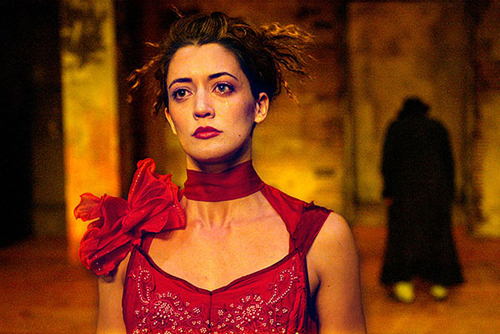
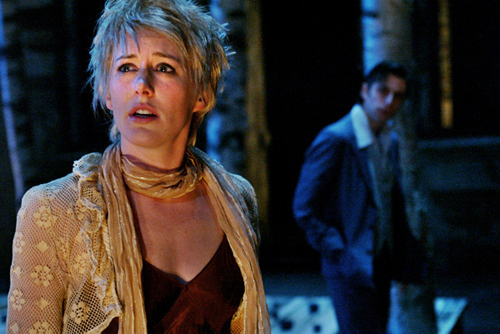
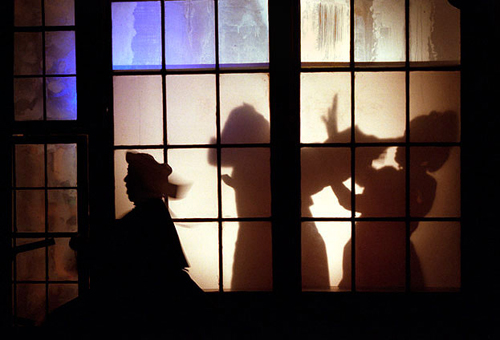
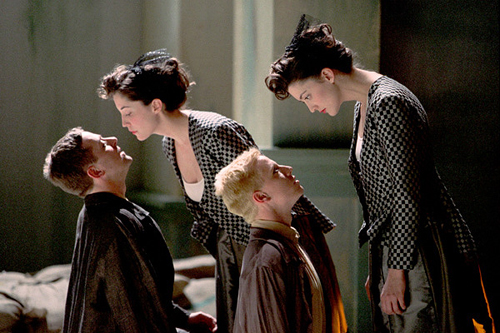
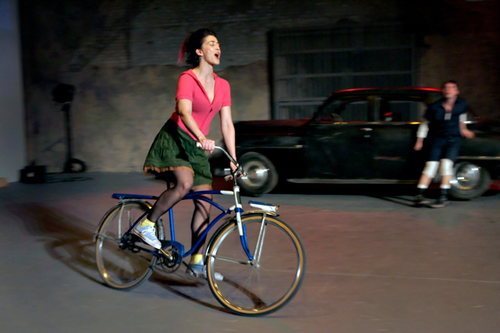
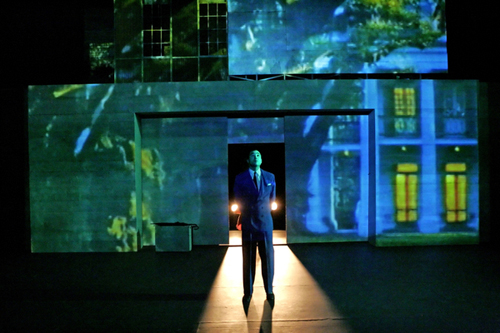
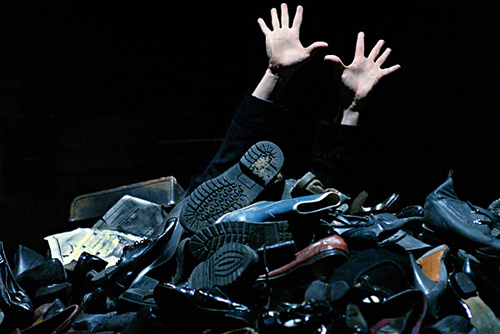



A KID IN A CANDY STORE. Thats how I often described my entry-level marketing job at Theatre de la Jeune Lune to friends.
Even during normal, nine-to-five, Monday-through-Friday business hours, the building overflowed with props, paints, giant set pieces, and the most wonderful costumes. The Jeune Lune building was once a small self-storage facility, so there were all manner of cubbyholes stuffed with unusual treasurea pile of suitcases and shoes from the original production of The Golem, a dismantled column from Tartuffe. On the rare occasions when I found myself wandering the building in search of its ghosts, I’d offer a silent prayer of gratitudeI was thankful for Jeune Lune’s existence itself, and that I could work in such a magical place, however briefly.
But, of course, that wasnt what I meantnot exactlywith my kid in a candy store quip. I was a heartbroken, tongue-tied 24-year-old woman when I first started working at the theater in 2000. My father, a gentle-hearted Vietnam vet, had passed away from an Agent Orange-related form of lung cancer only months earlier, and my rage had just started to bubble over. Frankly, Jeune Lunes apprenticeship and intern programs provided a steady stream of thoughtful, talented, and age-appropriate candy with whom I could drink, smoke, and converse about art, pain, disgust. In only one instance did I become romantically entangled, but even the platonic relationships I found there were vigorous enough to occupy a mind craving constant distraction.
_________________________________________________
The place was seething with sexual and creative energy
springing from Mozart, Molière, the buildings artfully decaying brickwork, and from Dominique Serrand marching
about to broadcast his artistic brilliance, bravado,
and, yes, his Parisian accent.
_________________________________________________
springing from Mozart, Molière, the buildings artfully decaying brickwork, and from Dominique Serrand marching
about to broadcast his artistic brilliance, bravado,
and, yes, his Parisian accent.
_________________________________________________
Perhaps its sleazy to reveal that Jeune Lune fed my romantic affairs and fantasies for three dizzying years, but there is a point to my confession: at the time, this rather naïve twenty-something found the place seething with sexual and creative energyspringing from Mozart, Molière, the buildings Gothic façade and artfully decaying brickwork, Dominique Serrand marching about to broadcast his artistic brilliance, bravado, and, yes, his Parisian accent. I was a child. I was hungry to feel things as deeply as he did. And I was able to, thanks to the wonderful friends I made at Jeune Lune and to seductive shows like Cosi fan Tutte and The Seagull. (For those who missed Jeune Lunes 2003 production of Chekhovs classic, I assure you: It sizzled.)
I also took my job working for the theater very seriously. In fact, before joining Jeune Lune, when I was trying to figure out what Id do with myself, I set out the way many recent college graduates do: I mapped out my values and skills, which determined that I was ridiculously idealistic and passionate only about my favorite music, literature, and art. Having seen Tartuffe, The Green Bird, and a handful of other spellbinding Jeune Lune productions as a young adult, I felt lucky to have landed a job I could believe in.
What is it about scale and spaceour feelings of importance, or of insignificance in relation to this worldthat fills our heads with helium and our stomachs with butterflies? The best metaphor I have for the experience of watching Jeune Lunes stunning 2001 production of Cosi fan Tutte, which I saw while I was still working at the theater, is almost a cliché, but here it is nonetheless: When I was a kid, I once climbed to the top of my hometowns water tower. From there, I could watch the clouds as they shape-shifted above the ugly buildings and evergreens and, for a millisecond; I thought I could feel the spinning earth pick up speed.
_________________________________________________
The grandeur and beauty of that cool, blue show injected my life
with a much-needed shot of transcendence.
_________________________________________________
with a much-needed shot of transcendence.
_________________________________________________
The grandeur and beauty of that cool, blue show injected my sad, little life with a much-needed shot of transcendence. I was thankful for it. I came back to life.
Back in the unlovely reality of my workdays in the administrative offices on Jeune Lunes fourth floorin the warren of used, upholstered chairs and scuffed office furnitureI sensed mounting tensions between the founding artistic directors. But I wasn’t intimate with any of them or privy to any first-hand accounts of their situation. I can say, however, that as a marketer for Jeune Lune, I was keenly aware of the theaters increasing struggle to sell tickets. I felt responsible, in fact.
After a while, the stress got to be too much. I left the company in May 2003, figuring I might as well earn my peanuts elsewhere.
But the year after I left, I fell in love all over againthis time with Jeune Lunes superb production of Carmen. Then, a couple of years later, I found another of their operas, Maria de Buenos Aires (2005), to be equally sensuous. In 2006, I brought a globetrotting European musician (complete with his own sexy accent) to see Jeune Lunes refiguring of Kafkas Amerika, Or the Disappearance. My goal, of course, was to impress, and it worked famously. I was beaming that night as my date and I left the theater arm in arm, as I listened to him rave about the remarkable, dream-like and musical world wed just visited. I was so proud of my adopted hometown of Minneapolis just then: for the fact that it hosted this sophisticated and gorgeous piece of theater.
But I didnt feel that way when I saw other recent shows, like this years Fishtank and last years Don Juan Giovanni. In fact, after being disappointed in the latter, I remember finding the following telling tidbit in the program notes, which seemed to confirm all the rumors Id been hearingthat the Lunies felt abandoned by their audience. The show was not recommended for people who fear the sense of vertigo that comes from staring into the chasm between life and death.
One cant be certain of the subtext, but the friend who accompanied me to the theater that evening was quick to offer his translation: If you dont like our boring show, then you must be an idiot. I wondered whether it reflected Jeune Lune’s attempts to rationalize their recent shows’ failure to connect with the audience.
So, despite all my fond memories and passion for the troupe, Ive decided its probably healthy and brave that Jeune Lune is closing its doors. For one thing, I hope the artists will find it rejuvenating to shed their skinnot to mention the financially burdensome structure of the organization and the costs of maintaining that big, beautiful, magical warehouse. But I also suspect the company had, in fact, fallen from grace with its core audience.
_________________________________________________
The truth is, not enough theatergoers supported Jeune Lune while it lasted; so why on earth should our cash-strapped city government feel compelled to intervene? My bigger concern is that we, the audience, have lost our appetites for adventure.
_________________________________________________
_________________________________________________
In the days following the June 22 announcement of Jeune Lunes closure, while cruising the related comments on the Star Tribune and St. Paul Pioneer Press websites, I found many folks squawking about the declining quality of Jeune Lunes output. Others called for a government or foundation-funded bailout for the theateran unlikely scenario. The truth is, not enough theatergoers supported Jeune Lune while it lasted, so why on earth should our cash-strapped city government feel compelled to intervene? In fact, I couldnt help but wonder whether such talk about a city-sponsored fix was just reflexive, arts-positive boosterism. Had these individuals truly been among the few to support Jeune Lune in recent yearseven as it faltered? Were those folks who were decrying the theater’s demise actually in attendance for Jeune Lune’s 2002 production of The Nuns? (Not many people were.)
Personally, it’s not the loss of Jeune Lune I’m worried about. Im not so sure its really Jeune Lune these days, anyway, without Barbra Berlovitz and the humbling presences of Vincent Gracieux and Robert Rosen. (In case youve been living under a rock: these founding artistic directors left the company in 2006.) Rather, my concern is that we, as theatergoers, have lost our appetites for adventure. Its understandable, in some respects: the economy is in the tank and our ticket-buying dollars are stretched thin, so we tend to invest in more conventional and therefore reliably decent productions. The only problem with that thinking is this: in sour times like these, when day after day theres so much devastating news, an arts-lover finds herself craving more than mere comfort.
Heres a suggestion: concerned theatergoers wanting to cut their losses in the wake of Jeune Lune’s closing can still throw their support behind other promising movement theater-makers like Jon Ferguson, Live Action Set, Off-Leash Area Productions, and Open Eye Figure Theatre. For me, these folks have inspired the same sorts of magic once channeled by our beloved Jeune Lune. Whether with gymnastics or contortionism, puppetry or other low-tech spectacles, these artists are able to pick up and move the worlds around them. In turn, they can move an audience, too. For these performers, the theatrical world is three-dimensional; they approach performance as if it were a solar system, as opposed to the flat-earth theater we get time and again.
Dont forget that Jeune Lune co-founders Barbra Berlovitz and Robert Rosen have been Minneapolis-based freelance artists ever since they were ejected from the company in 2006. (Vincent Gracieux, on the other hand, returned to France.) Now, it seems, Dominique Serrand and Stephen Epp will be joining their ranks. With any luck, theyll only continue what Jeune Lune did so well for nearly thirty years: discovering the new in the old, embracing the cyclical phases of darkness of renewal, and, on occasion, preparing feasts of theater so powerful as to mend our broken hearts.
About the writer: Christy DeSmith is a former editor at The Rake. She is also a freelance theater critic and was recently named an affiliated writer for 2007-08 by the Theatre Communications Group and American Theatre magazine.